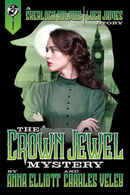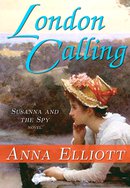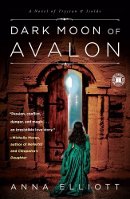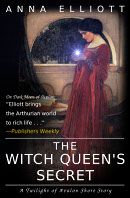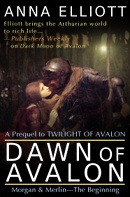Getting an Agent and Getting Published
Anna Elliott
| Q. | How do I go about finding an agent? |
| A. |
I would say your first step should be to read the website Writer Beware because unfortunately there are many pitfalls that an aspiring author can fall into. Then go to your local bookstore and buy a guide to literary agents. There are several, printed annually, and they give you names and basic facts about hundreds of agents out there. Or for a small fee you can join an on-line site like Writer's Market. Identify agents who represent books that seem similar to yours. Then read everything you can on writing a compelling query letter (most guides to literary agents will include querying workshops, as well. Or there are many on-line sites devoted to the purpose). Write up your query letter, polish and polish it until you're convinced its as eye-catching and professional and close to perfect as you can make it. And start querying.
This can be a discouraging process. Many agents already represent as many authors as they can handle, many others simply don't have the time to devote to launching an unpublished author's career. You will probably get rejections--many of them. Keep them in a drawer, know that you're very strong for persevering and believing in your book, and try not to lose hope. And celebrate every step forward you take, every milestone you reach. If an agent asks for the first 50 pages of your manuscript, go out to dinner, even if the agent ultimately says 'no thanks'. Be proud, even if you find an agent who ultimately doesn't work out. You've taken one step more on the path, come that much closer to publication! |
| Q. | Do I really need an agent to get published? |
| A. |
You don't absolutely need one--but it most definitely makes the process easier and your chances of an editor buying your book far, far greater.
That said, it's very important to find the right agent. Even among the completely legitimate agents, there's a pretty broad spectrum, ranging from the "really great" to the "not so good." I myself had a fairly discouraging agent experience early on in my career as an aspiring writer. This agent was with a large New York agency, just starting out as a literary agent, eager to build a list, and a nice person--really, a very nice person. And I truly don't harbor any bad feelings or resentment about the whole experience at all, because it was one more step I needed to take on the road to publication. The only reason I bring this up here is that there were warning signs--if only I'd been a bit more experienced and smarter about reading them--that it might be helpful for other aspiring writers out there to hear. Oh, and before I start, I should make it clear that the book my first agent represented was one of my early efforts, an entirely different book from Twilight of Avalon, the one that my second agent represented and sold. So, my first agent: Called me to discuss representation. We talked for maybe 10-15 minutes. She said she'd enjoyed the book, which was great to hear, of course, but she never offered any specific editorial feedback. We never met in person. All the contract signing was done by mail, and as far as I can remember, we never spoke on the phone again. Although I did get an e-mailed list of the publishing houses my book had been submitted to, with a note saying that it would probably be awhile before we got any responses back. Months went by. I wondered what was happening with my book. Had we gotten any responses from editors? Should I call? But my agent had told me it could take awhile. And all my guidebooks to agents said that agents' "nightmare clients" are the ones that call and pester them about what's happening with submissions. I didn't want to be one of those, of course--so, I never called. Probably 9 months later, after still not having heard a word about how the submissions were going, I got a packet from my agent in the mail. It included somewhere around a dozen rejection letters from the editors my book had been sent to, and a cover letter saying that my agent was dropping all of her clients to pursue another career. It was a pretty low point. Contrast that to my second agent: When he called me to express interest in Twilight of Avalon, he spent probably half an hour on the phone asking about my background, why I'd written the book I had, and where I saw myself going as a writer. He asked about my family, and when I told him I had a husband and a baby girl (at this point age 7 months or so) he asked whether I was still nursing. I was a bit surprised, but told him I was. He immediately said, Oh, well, I would really like to meet you in person, but since you're still nursing I'll drive down to see you (an hour and a half trip each way) because that will be much less stressful for you and your daughter. Wow. He spent an afternoon with me, talking further about Twilight of Avalon and the rest of my planned trilogy. He gave me an outline of just what our submission strategy was going to be like, and even offered an estimate on the kind of advance he would hope/expect to get for the trilogy. He also offered me keen editorial advice about pruning, tightening, and polishing the book, making it the very strongest proposition it could be before any editors saw it. Before becoming an agent, he had worked as an editor of historical fiction, so his insights were excellent. When the time came to begin submissions, he kept me fully posted on every part of the process, even calling me to give me a few background details about every one of the editors and publishing houses we were submitting to. When we had offers on the table, he set up meetings with the interested editors and came with me into New York City to meet with them and see where we both felt the trilogy would find the best home. Just a week and a half or so after the manuscript had first gone out, we had an offer from Touchstone and soon after had signed a 3-book publishing contract for pretty much the exact amount he had told me we could hope for. Since then, my agent has been there to help me navigate every part of the publication process, advocating for me (in a completely warm and charming way) with everyone we have dealt with since signing the contracts. I'd pretty much nominate him for sainthood any time. |
| Q. | Is it okay to query agents before I finish a book? |
| A. |
Writing a book can be a very long process. Many seemingly endless stretches of months without any outward encouragement or gratification. So I can completely understand why it could be tempting to start querying agents before you finish your work in progress. But really, the answer to the above question is no. I would even say you shouldn't query agents until you've finished at least your second or third draft of your book.
Agents get so very many queries (hundreds a week, in many cases) and most reject about 99% of their submissions. They're looking for easy ways to thin out the submissions pile, and querying about an unfinished book is kind of like wearing your pajamas to a job interview. An easy way for the interviewers to eliminate you from the other candidates and pretty much ensure that they won't consider you seriously, even if you're the best candidate for the job. What you really want your queries to accomplish is to make you stand out from the crowd. And to do that you really want to make sure that what you're submitting is the absolute best, the most polished, the most mature work you're capable of. |
| Q. | At what point should I 'give up' on a book? It's my baby! How can I tell? |
| A. |
Oh, this is such a tough one. You devote a year (or longer) to working on a book, falling in love with your cast of characters, making your whole imagined world come alive. And then you try to sell it. And try. And try. And you face the wrenching question of whether to keep trying to improve what you have or start afresh with a new idea. I've been there myself. Six times. And (just ask my poor husband) I cried every time I had to abandon an idea and start over from square one. So believe me, I do know how heartbreaking to have to give up on a book that way--but at the same time, I think almost every author out there has had to do just that. I'm not sure it ever gets to be an easy choice to make, but I do think it's an important skill to learn.
I would say that if you've queried every agent on your list of possibles and been rejected, as hard as it is to face the prospect, it's probably time to try something new. Or if you've landed an agent, and he/she has spent a full year trying to sell your book with no luck. (Although your agent may have different guidelines, of course talk to him/her about the question first). If this has happened to you, I think probably the best advice I can give you is to just keep writing and not give up hope. Every time you write a book, you learn vastly from the process. Every page, every sentence you write, makes you grow as a writer. So even if you have to give up on a beloved story, don't give up on writing altogether. You'll bring that much more experience, that much more maturity as a writer to the next story you bring to life--making it that much more likely that that story will at last be the one to sell. |
| Q. | How important is it to cater my book to the 'market'? |
| A. |
This is another tough one, because I truly believe that the only really good reason to write a book is because you're inspired--because this is a story that you just have to tell, or something vital inside you is going to die. And I think, too, that in many ways the simple act of writing has to be enough for you--something you are so in love with that you would do it no matter what. Regardless of whether you were paid for the job.
At the same time, if your goal is for writing to be your full-time job, obviously it needs to support you and your family financially. And the publishing industry is just that--a commercial industry, with trends, fads, highs and lows. Agents and editors have definite and often very specific ideas about the kinds of books they're looking for. And at any point in time, certain books are simply going to be more marketable than others and hence easier for aspiring authors to sell. This is not to say that a book that bucks the trends and breaks all the rules cannot sell. Many of them have, and have become smash hits. It just means that a rule-breaking book has to be that much more outstanding to catch an agent/editor's eye. So I guess my answer to that question is that if you're pursuing writing as a paying career, I think you have to reach something of a balance. By all means, write the books that you're passionate about telling, that you would scratch into the sand on a desert island if you were stranded on one without paper because you just have to get them down. But at the same time, being aware of the realities of the publishing world and the response you'll likely face when you go knocking on agents' and editors' doors can save you heartbreak in the end. |
| Q. | Am I crazy to think about self-publishing? |
| A. | That depends on why you want to be published. If you're hoping to earn a living at writing, self-publishing is highly unlikely to pay off. (Although, yes, of course, there are those occasional success stories, so you never know!) But if you simply want to share a book, a story, with family and friends or with another small, select group of people, self-publishing can be a great option. |
| Q. | What is working with an editor like? |
| A. |
This is a question that I get a lot from aspiring authors, and something that I was really nervous about even before my agent and I started the submission process. What if an editor wants me to make changes I hate? What if she says I have to completely re-write the book?
First, I think you do have to be prepared to accept criticism (see above). Any editor who buys your book, no matter how much enthusiasm they have for it, is going to have changes to suggest. But the thing is, an editor's job is to make books better. So, it pretty much makes sense that they'll have some good ideas about how to . . . well, make your book better. I do think it's important to find the right editor--as important as it is to find the right agent. I had the chance to meet with my editor before the final bid on my trilogy was made, so I felt really good about accepting the offer. I'd liked her right away as a person and knew I'd be comfortable working with her--and then, too, I'd had a really good feeling about her understanding the book I'd written. So, all that is a very long introduction to the answer that I have found working with an editor to be nothing but great. My editor is very sensitive and thoughtful about her feedback. She never asks for specific changes--she more so just points out opportunities that I might want to take, different directions I might want to go. She also makes it clear that her suggestions are just that--suggestions. I can ignore them if I strongly disagree. But I never did--as far as I can remember, I took every last one of her suggestions on the manuscript on Twilight. And when we'd finished the editorial process, I felt even happier about the book than when we'd begun--I really felt like she'd helped me uncover the book I'd intended to write all along. |


